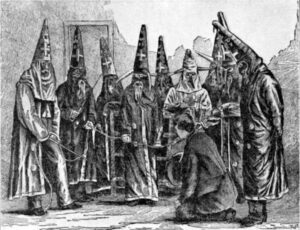Months ago, Trump elicited guffaws in the non-Trumpist press and social media when he bragged about an amazing new “hydrosonic missile” purportedly under development. In the intervening time he has repeated the phrase—today, for instance:
 Note how he uses both the correct and incorrect words. Very often when Trump misspeaks, he repeats the error and improvises on it briefly as if it were the word he actually intended to use. He is doing something similar here. The listener is meant to conclude that Trump did not make a mistake (months ago, when he first mentioned the “hydrosonic missile”); that, in fact, Trump never makes a mistake, never suffers even an innocent slip of the tongue, because the brilliant Donald Trump is just never wrong. The working assumption here, giving him the (undeserved) benefit of the doubt, is that Trump knows “hydrosonic” is … not wrong, no—just not the word some people use for it.
Note how he uses both the correct and incorrect words. Very often when Trump misspeaks, he repeats the error and improvises on it briefly as if it were the word he actually intended to use. He is doing something similar here. The listener is meant to conclude that Trump did not make a mistake (months ago, when he first mentioned the “hydrosonic missile”); that, in fact, Trump never makes a mistake, never suffers even an innocent slip of the tongue, because the brilliant Donald Trump is just never wrong. The working assumption here, giving him the (undeserved) benefit of the doubt, is that Trump knows “hydrosonic” is … not wrong, no—just not the word some people use for it.
This brings to mind an exquisite footnote in Hannah Arendt’s The Origins of Totalitarianism. In a book laden with footnotes, this one drops before she is even out of the first page, and in fact is longer than the body text on that page. Here it is, in its entirety:
The “magic spell” that Hitler cast over his listeners has been acknowledged many times, latterly by the publishers of Hitlers Tischgespräche, Bonn, 1951 (Hitler’s Table Talks, American edition, New York, 1953; quotations from the original German edition). This fascination—“the strange magnetism that radiated from Hitler in such a compelling manner”—rested indeed “on the fanatical belief of this man in himself” (introduction by Gerhard Ritter, p. 14), on his pseudo-authoritative judgments about everything under the sun, and on the fact that his opinions—whether they dealt with the harmful effects of smoking or with Napoleon’s policies—could always be fitted into an all-encompassing ideology.
Fascination is a social phenomenon, and the fascination Hitler exercised over his environment must be understood in terms of the particular company he kept. Society is always prone to accept a person offhand for what he pretends to be, so that a crackpot posing as a genius always has a certain chance to be believed. In modern society, with its characteristic lack of discerning judgment, this tendency is strengthened, so that someone who not only holds opinions but also presents them in a tone of unshakable conviction will not so easily forfeit his prestige, no matter how many times he has been demonstrably wrong. Hitler, who knew the modern chaos of opinions from first-hand experience, discovered that the helpless seesawing between various opinions and “the conviction … that everything is balderdash” (p. 281) could best be avoided by adhering to one of the many current opinions with “unbending consistency.” The hair-raising arbitrariness of such fanaticism holds great fascination for society because for the duration of the social gathering it is freed from the chaos of opinions that it constantly generates. This “gift” of fascination, however, has only social relevance; it is so prominent in the Tischgespräche because here Hitler played the game of society and was not speaking to his own kind but to the generals of the Wehrmacht, all of whom more or less belonged to “society.” To believe that Hitler’s successes were based on his “powers of fascination” is altogether erroneous; with those qualities alone he would have never advanced beyond the role of a prominent figure in the salons. [The Origins of Totalitarianism (new edition with added prefaces): New York, Harcourt (Harvest), 1976, p. 306]
Granted, there is much here that does not apply directly to Trump—e.g., that the “fascination” is restricted to the leader’s inner circle, or that the leader picks only one idea and sticks with it despite evidence that undermines or even nullifies it, or that all his opinions fit into a broad ideology (unless one takes Trump-the-person to be an ideology). Trump is notorious for changing his tune repeatedly and shamelessly—i.e., without any visible or audible indication that he was saying something drastically or diametrically different mere days (or minutes) ago.
What does resonate, however, is the way the leader takes advantage of his adherents’ “opinion fatigue” and projects a certitude that they gladly accept and freely regurgitate, in sound bites and slogans. Any skepticism that might naturally be directed at a leader is magically redirected to anyone who expresses skepticism about the leader, or who merely reports facts that the leader has rejected as “fake.”
This is only one aspect of the Trump phenomenon, of course. One might spend a fruitful few minutes examining the play-acting that he and his followers engage in. He is, after all, a product of “reality TV,” a massive pretense millions have happily immersed themselves in; and he did have a long run of pretending to be a successful businessman. The crowds at Trump’s rallies resemble those at rock concerts more than they evoke images of a Nuremburg rally. But there are hard truths underlying his followers’ chants and antics, which can be seen in the symbols they bring to the events (e.g., Confederate flags) and the white supremacism, sexism, xenophobia, and resentments (of all sorts—e.g., resentment of those with expertise) that Trump has freed them to express publicly.
As Paul Farhi notes, the hydrosonic missile “does not exist.” It is just one of myriad things Donald Trump spends time talking about that do not exist. He has filled the public sphere and all of our lives with non-existent crap—Gresham’s Law applied to the national discourse.
* * * * *
A few pages after the footnote cited above, one encounters another stretch of text that resonates today:
Totalitarian movements are possible wherever there are masses who for one reason or another have acquired the appetite for political organization. Masses are not held together by a consciousness of common interest and they lack that specific class articulateness which is expressed in determined, limited, and obtainable goals. The term masses applies only where we deal with people who either because of sheer numbers, or indifference, or a combination of both, cannot be integrated into any organization based on common interest, into political parties or municipal governments or professional organizations or trade unions. Potentially, they exist in every country and form the majority of those large numbers of neutral, politically indifferent people who never join a party and hardly ever go to the polls.
It was a characteristic of the rise of the Nazi movement in Germany and of the Communist movements in Europe after 1930 that they recruited their members from this mass of apparently indifferent people whom all other parties had given up as too apathetic or too stupid for their attention. The result was that the majority of their membership consisted of people who never before had appeared on the political scene. This permitted the introduction of entirely new methods into political propaganda and indifference to the arguments of political opponents; these movements not only placed themselves outside and against the party system as a whole, they found a membership that had never been reached, never been “spoiled” by the party system. Therefore they did not need to refute opposing arguments and consistently preferred methods which ended in death rather than persuasion, which spelled terror rather than conviction. They presented disagreements as invariably originating in deep natural, social, or psychological sources beyond the control of the individual and therefore beyond the power of reason. This would have been a shortcoming only if they had sincerely entered into competition with other parties; it was not if they were sure of dealing with people who had reason to be equally hostile to all parties. [The Origins of Totalitarianism, pp. 311–12]
Leaving aside the question of the legitimacy or correctness of the views enunciated by Trump’s core (or, one might say, hard-core) followers, it would seem reasonable to describe these opinions as simpleminded (or, at the very least, simple). This observation would jibe with Arendt’s description of the masses that entered politics for the first time in the periods and places cited above. Also striking is her assertion that these people had no interest in refuting opposing arguments, preferring intimidation to persuasion.
That so many of today’s Trumpists believe in a virtually unlimited Second Amendment right to “bear arms” and are not shy about showing up in force, armed with semiautomatic rifles and other weaponry, at politically sensitive venues (demonstrations, legislature buildings, locations where votes are being tabulated, the homes of government officials, etc.), and that so many of them utter death threats in person and online against their enemies (viz, fellow citizens who disagree with them), should be seen as a seriously troubling sign of a slide toward terrorism in US politics. It may be tempting to dismiss the antics of armed citizens as theater (as noted above) and nothing more. But history is clearly warning us that we ignore such manifestations of the totalitarian (or authoritarian) mindset at our own peril.
One final note: Trump, the Republican Party, and those who support them are dedicated to maintaining—and expanding—minority rule in the United States of America. After decades of ruthlessly exploiting the structural defects in the US system that allow for the less numerous to work their will on the entire polity, instituting less popular policies rather than enacting the wishes of most of the citizenry, the emergence of a previously inert or malleable base sympathetic to a “strong man” (or, more precisely, a lockstep authoritarian clique) has added a new arrow (so-called “populism”) to the GOP’s quiver, paradoxically supplementing the virtually untrammeled power of Big Money.






 Note how he uses both the correct and incorrect words. Very often when Trump misspeaks, he repeats the error and improvises on it briefly as if it were the word he actually intended to use. He is doing something similar here. The listener is meant to conclude that Trump did not make a mistake (months ago, when he first mentioned the “hydrosonic missile”); that, in fact, Trump never makes a mistake, never suffers even an innocent slip of the tongue, because the brilliant Donald Trump is just never wrong. The working assumption here, giving him the (undeserved) benefit of the doubt, is that Trump knows “hydrosonic” is … not wrong, no—just not the word some people use for it.
Note how he uses both the correct and incorrect words. Very often when Trump misspeaks, he repeats the error and improvises on it briefly as if it were the word he actually intended to use. He is doing something similar here. The listener is meant to conclude that Trump did not make a mistake (months ago, when he first mentioned the “hydrosonic missile”); that, in fact, Trump never makes a mistake, never suffers even an innocent slip of the tongue, because the brilliant Donald Trump is just never wrong. The working assumption here, giving him the (undeserved) benefit of the doubt, is that Trump knows “hydrosonic” is … not wrong, no—just not the word some people use for it.



